STRUCTURE ET ORGANISATION
Compas réunit dans le cadre du Département d’études cognitives de l’École normale supérieure et de l’Institut de l’École normale supérieure des chercheurs de diverses disciplines. Il s’appuie sur un cercle d’experts engagés dans la recherche ou en éducation, et sur un comité scientifique international, couvrant un large spectre de compétences.
Members
- Daniel Andler, director
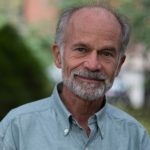
Daniel Andler, emeritus professor at Sorbonne Université (formerly Paris IV), honorary member of the Institut universitaire de France and member of the Académie des sciences morales et politiques, is a logician and a philosopher of science and epistemology. His central interest lies in the foundations of cognitive science and the import of this field on our understanding of mankind and the role of philosophy. He defends a liberal version of naturalism, with the aim of articulating cognitive science with the social sciences. He is also engaged in a number of projects concerning the use of scientific knowledge in policy issues, and the transformations of education brought about by advances in cognitive science and information technologies. He has published extensively in philosophy of science and on the foundations of cognitive science. His latest book is La Silhouette de l’humain. Quelle place pour le naturalisme dans le monde d’aujourd’hui? (Gallimard, 2016); he is a co-editor of La Cognition. Du neurone à la société (Gallimard, coll. Folio, 2018).
He founded and directed a number of institutions, among which the Department of Cognitive Studies (DEC) at Ecole normale supérieure, the research team Sciences, normes, décision (SND), the Société de philosophie des sciences (SPS), the master’s program in cognitive science (ENS-EHESS-Univ, Paris-Descartes), and the Compas group, a think-tank within DEC, dedicated to exploring the synergies between cognitive science and ICT in education.
More details here.
- Roberto Casati
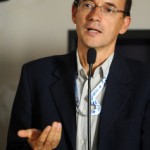 I am Senior Resarcher with CNRS at Institut Jean Nicod (ENS, EHESS), Paris, France. I work at the boundary of philosophy and cognitive sciences, with a particular attention to policies and the design of educational settings. I studied with Andrea Bonomi and Giovanni Piana in Milan, Italy, where I got my PhD (on Events) in 1992. I also hold a PhD from the University of Geneva, Switzerland (on Secondary Qualities, 1991), under the direction of Kevin Mulligan. I have worked on various research projects on philosophy of perception, in particular under the direction of Barry Smith, and have taught at several universities, among which the State University of New York at Buffalo. Most recently I have been visiting professor at the Università IUAV, Venice, at the University of Turin, and at Columbia University. I am the recipient of various prizes and of grants from several institutions, including CNRS, MENRT, and the European Commission. I was responsible, for Institut Nicod, of the Enactive Network of Excellence (IST-2002-002114). I have published on journals such as Analysis, Proceedings of the Aristotelian Society, Studia Leibnitiana, Journal of Aesthetics and Art Criticism, Perception, Trends in Cognitive Science, Journal of Visual Language and Computing, Dialectica, Australasian Journal of Philosophy, Philosophical Studies, Philosophical Psychology, Behavioral and Brain Sciences. This somewhat nonstandard spread reflects my interdisciplinary interest as a philosopher of the cognitive sciences, focused on the psychological status of commonsense notions (such as that of object, event, colors, sounds, and holes and shadows) and the proper methodology for studying these notions. Having received a parallel education as a graphic designer, I am also interested in issues in the cognitive study of art and in public representations.
I am Senior Resarcher with CNRS at Institut Jean Nicod (ENS, EHESS), Paris, France. I work at the boundary of philosophy and cognitive sciences, with a particular attention to policies and the design of educational settings. I studied with Andrea Bonomi and Giovanni Piana in Milan, Italy, where I got my PhD (on Events) in 1992. I also hold a PhD from the University of Geneva, Switzerland (on Secondary Qualities, 1991), under the direction of Kevin Mulligan. I have worked on various research projects on philosophy of perception, in particular under the direction of Barry Smith, and have taught at several universities, among which the State University of New York at Buffalo. Most recently I have been visiting professor at the Università IUAV, Venice, at the University of Turin, and at Columbia University. I am the recipient of various prizes and of grants from several institutions, including CNRS, MENRT, and the European Commission. I was responsible, for Institut Nicod, of the Enactive Network of Excellence (IST-2002-002114). I have published on journals such as Analysis, Proceedings of the Aristotelian Society, Studia Leibnitiana, Journal of Aesthetics and Art Criticism, Perception, Trends in Cognitive Science, Journal of Visual Language and Computing, Dialectica, Australasian Journal of Philosophy, Philosophical Studies, Philosophical Psychology, Behavioral and Brain Sciences. This somewhat nonstandard spread reflects my interdisciplinary interest as a philosopher of the cognitive sciences, focused on the psychological status of commonsense notions (such as that of object, event, colors, sounds, and holes and shadows) and the proper methodology for studying these notions. Having received a parallel education as a graphic designer, I am also interested in issues in the cognitive study of art and in public representations. - Fabienne Cazalis
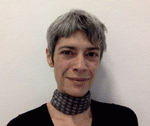 Fabienne Cazalis is a researcher with CNRS at Centre d’Analyse et de Mathématique Sociales (EHESS-CNRS), and a resident at l’Institut des Systèmes Complexes Ile-de-France (CNRS). After studying executive functions using fMRI (University Paris 6, EHESS, hôpital Raymond Poincaré, University of California Los Angeles), she was a professor of clinical neuroscience (Ross University School of Medicine, New Jersey, Commonwealth of Dominica). She now studies autistic cognitive abilities.
Fabienne Cazalis is a researcher with CNRS at Centre d’Analyse et de Mathématique Sociales (EHESS-CNRS), and a resident at l’Institut des Systèmes Complexes Ile-de-France (CNRS). After studying executive functions using fMRI (University Paris 6, EHESS, hôpital Raymond Poincaré, University of California Los Angeles), she was a professor of clinical neuroscience (Ross University School of Medicine, New Jersey, Commonwealth of Dominica). She now studies autistic cognitive abilities.
-
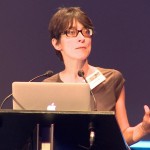 Elena Pasquinelli works for the Fondation La main à la pâte – pour l’éducation à la science
Elena Pasquinelli works for the Fondation La main à la pâte – pour l’éducation à la science
Her job consists in keeping the team informed and documented about what happens in the domain of education and cognitive science and in joining other members of La main à la pâte in the development of educational modules or activities, as well as in the professional training of teachers and teachers’ trainers. She is also associate member of the Institut Jean Nicod. Her domain of research is the philosophy of cognitive sciences and her research interests are in mind-brain-behavioral studies and their application to domains of social interest, namely: education, the media and technology.
Scientific Committee
- † Edith Ackermann (Psychologie, MIT Media Lab)
- Stefana Broadbent (Digital Anthropology, University College London)
- Elisabeth Caillet
- Nicolas Gauvrit
- Valeria Giardino
- Denis Meuret
- Darleen Opfer
- Manuela Piazza
- Franck Ramus
- Emmanuel Sander
- Pierre Saurel
- David Williamson Shaffer (Educational Psychology, University of Wisconsin-Madison)
- Sidney Strauss
- Brent Strickland
- André Tricot
- Daniel Wagner
- Tiziana Zalla
- Orit Zaslavsky
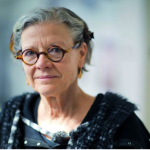 Edith K. Ackermann is a Honorary Professor of Developmental Psychology, University of Aix-Marseille, France, and former Associate Professor of Media Arts and Sciences at the MIT Media Laboratory. Edith also was as a Senior Research Scinetist at MERL – A Mitsubishi Electric Research Lab, Cambridge MA, and worked as a Scientific Collaborator at the Centre International d’Epistémologie Génétique, under the direction of Jean Piaget, in Geneva, Switzerland. She earned a Doctor of Developmental Psychology [Com Laude]; two Master’s degrees in Developmental Psychology and Clinical Psychology; and a Bachelor of Experimental Psychology degree, all from the University of Geneva, Switzerland. Current appointments and collaborations include: The Responsive Environments Group at the Harvard Graduate School of Design; The Personal Robots group at the MIT Media Lab, and the Computing group at the MIT School of Architecture. The Exploratorium Science Museum, San Francisco, CA., and The LEGO group, DK—as well as other organizations and institutions interested in the relations between play, imagination, and creativity, in human learning. Édith died in December 2016.
Edith K. Ackermann is a Honorary Professor of Developmental Psychology, University of Aix-Marseille, France, and former Associate Professor of Media Arts and Sciences at the MIT Media Laboratory. Edith also was as a Senior Research Scinetist at MERL – A Mitsubishi Electric Research Lab, Cambridge MA, and worked as a Scientific Collaborator at the Centre International d’Epistémologie Génétique, under the direction of Jean Piaget, in Geneva, Switzerland. She earned a Doctor of Developmental Psychology [Com Laude]; two Master’s degrees in Developmental Psychology and Clinical Psychology; and a Bachelor of Experimental Psychology degree, all from the University of Geneva, Switzerland. Current appointments and collaborations include: The Responsive Environments Group at the Harvard Graduate School of Design; The Personal Robots group at the MIT Media Lab, and the Computing group at the MIT School of Architecture. The Exploratorium Science Museum, San Francisco, CA., and The LEGO group, DK—as well as other organizations and institutions interested in the relations between play, imagination, and creativity, in human learning. Édith died in December 2016.
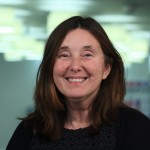 Prior to joining Nesta, Stefana was a Lecturer in Digital Anthropology in the Department of Anthropology at UCL. Between 2004 and 2008 she directed the Swiss observatory of digital practices in the Innovation Department of Swisscom and was a member of Swisscom’s Strategy Board. Previously, she was in the executive team of Iconmedialab (now Digitas LBi) a position which followed the acquisition of her research company CBJ in 1998. She has held advisory positions in various European countries as an expert on the social impact of ICT. Stefana has been a lecturer in the Politecnico di Milano, the ENSAD in Paris and has been an invited lecturer in various Swiss Universities Stefana has a degree in Psychology from the University of Geneva and a PhD in Cognitive Science from the University of Edinburgh. Her recent publications include chapters in the The Onlife Manifesto (2015) and Digital Anthropology (2012) and her book L’intimite au Travail (2011) which received the AFCI prize for Social Sciences. A lot of what she thinks about technology is in her TED talk.
Prior to joining Nesta, Stefana was a Lecturer in Digital Anthropology in the Department of Anthropology at UCL. Between 2004 and 2008 she directed the Swiss observatory of digital practices in the Innovation Department of Swisscom and was a member of Swisscom’s Strategy Board. Previously, she was in the executive team of Iconmedialab (now Digitas LBi) a position which followed the acquisition of her research company CBJ in 1998. She has held advisory positions in various European countries as an expert on the social impact of ICT. Stefana has been a lecturer in the Politecnico di Milano, the ENSAD in Paris and has been an invited lecturer in various Swiss Universities Stefana has a degree in Psychology from the University of Geneva and a PhD in Cognitive Science from the University of Edinburgh. Her recent publications include chapters in the The Onlife Manifesto (2015) and Digital Anthropology (2012) and her book L’intimite au Travail (2011) which received the AFCI prize for Social Sciences. A lot of what she thinks about technology is in her TED talk.
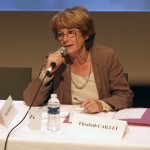 Elisabeth Caillet est agrégée de philosophie, docteur en Sciences de l’éducation, expert en médiation culturelle. Après avoir enseigné la philosophie elle a rejoint l’Agence nationale pour l’Education Permanente (ADEP), puis travaillé à la conception des actions d’éducation et de formation de la Cité des Sciences et de l’Industrie.
Elisabeth Caillet est agrégée de philosophie, docteur en Sciences de l’éducation, expert en médiation culturelle. Après avoir enseigné la philosophie elle a rejoint l’Agence nationale pour l’Education Permanente (ADEP), puis travaillé à la conception des actions d’éducation et de formation de la Cité des Sciences et de l’Industrie.
Elle a ensuite mis en place le service des publics de la Direction des Musées de France et travaillé à la professionnalisation des intervenants en éducation artistique et culturelle du monde de la culture. Elle a créé le Centre de ressources du centre national des Arts Plastiques puis a été chargée de mission au Centre national d’enseignement à distance (CNED) pour la création d’un campus numérique pour la formation des médiateurs culturels (CampusCultura).
Intervenante en médiation culturelle dans plusieurs universités françaises et étrangères et à l’Ecole du Louvre. Jusqu’en février 2009, elle a été responsable du Musée virtuel du Musée de l’Homme/Museum national d’histoire naturelle. Elle est consultante en muséologie et expert en médiation culturelle.
 I primarily studied mathematics and non-classical logics, and then turned to psychology. I am particularly interested in educational studies in mathematics, with a focus on probability, statistics and reasoning. More generally, I’m interested in connections between mathematics and psychology. For a few years now, I’ve been studying algorithmic complexity applied to psychology, which is my main focus now.
I primarily studied mathematics and non-classical logics, and then turned to psychology. I am particularly interested in educational studies in mathematics, with a focus on probability, statistics and reasoning. More generally, I’m interested in connections between mathematics and psychology. For a few years now, I’ve been studying algorithmic complexity applied to psychology, which is my main focus now.
 Chargée de recherche au CNRS, Archives Henri Poincaré – Laboratoire des Sciences et de Philosophie, Université de Lorraine. Much of my work is devoted to the analysis of diagrammatic reasoning. The objective of my research is to define a theory of human cognition that would explain the relation between human more spontaneous capacities and the « extensions » of the mind. My work is at the crossroad between philosophy, cognitive science and history of science.
Chargée de recherche au CNRS, Archives Henri Poincaré – Laboratoire des Sciences et de Philosophie, Université de Lorraine. Much of my work is devoted to the analysis of diagrammatic reasoning. The objective of my research is to define a theory of human cognition that would explain the relation between human more spontaneous capacities and the « extensions » of the mind. My work is at the crossroad between philosophy, cognitive science and history of science.
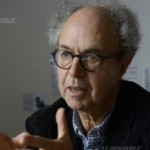 Professeur émérite en sciences de l’éducation à l’Iredu
(université de Bourgogne), il a publié, entre autres, Pour une école qui aime
le monde. Les leçons d’une comparaison France-Québec (1960-2012), Presses universitaires de Rennes, 2013, et Gouverner l’école. Une comparaison France-États-Unis, Puf, 2007.
Professeur émérite en sciences de l’éducation à l’Iredu
(université de Bourgogne), il a publié, entre autres, Pour une école qui aime
le monde. Les leçons d’une comparaison France-Québec (1960-2012), Presses universitaires de Rennes, 2013, et Gouverner l’école. Une comparaison France-États-Unis, Puf, 2007.
 Darleen’s research interests are primarily focused on understanding teacher learning. She has conducted studies on factors such as beliefs, motivations, and school conditions which impact whether teachers engage in professional learning and then implement what they have learned in their classrooms. She is currently conducting two studies of teachers: a national study in the U.S. on how teachers’ practices change as they implement new teaching standards and a study for OECD which will video tape teachers in multiple countries to look at the relationship between teaching practices and student outcomes.
Darleen’s research interests are primarily focused on understanding teacher learning. She has conducted studies on factors such as beliefs, motivations, and school conditions which impact whether teachers engage in professional learning and then implement what they have learned in their classrooms. She is currently conducting two studies of teachers: a national study in the U.S. on how teachers’ practices change as they implement new teaching standards and a study for OECD which will video tape teachers in multiple countries to look at the relationship between teaching practices and student outcomes.
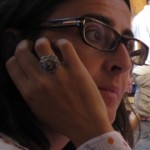 Professor at Dipartimento di Psicologia e Scienze Cognitive – Centro Interdipartimentale Mente/Cervello- CIMEC.
Professor at Dipartimento di Psicologia e Scienze Cognitive – Centro Interdipartimentale Mente/Cervello- CIMEC.
 I am a CNRS senior research scientist and adjunct professor at the Laboratoire de Sciences Cognitives et Psycholinguistique, Institute of Cognitive Studies, Ecole Normale Supérieure in Paris, within which I head the « Cognitive development and pathology » team. My research bears on the development of language and social cognition in children, its disorders (developmental dyslexia, specific language impairment, autism), its cognitive and neural bases and its genetic and environmental determinants.
I am a CNRS senior research scientist and adjunct professor at the Laboratoire de Sciences Cognitives et Psycholinguistique, Institute of Cognitive Studies, Ecole Normale Supérieure in Paris, within which I head the « Cognitive development and pathology » team. My research bears on the development of language and social cognition in children, its disorders (developmental dyslexia, specific language impairment, autism), its cognitive and neural bases and its genetic and environmental determinants.
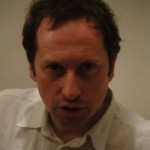 Responsable de l’équipe CRAC (Compréhension, Raisonnement et Acquisitions des Connaissances) du Laboratoire Paragraphe EA349, Université Paris 8
Responsable de l’équipe CRAC (Compréhension, Raisonnement et Acquisitions des Connaissances) du Laboratoire Paragraphe EA349, Université Paris 8
L’orientation générale de ses recherches s’inscrit dans une perspective cognitive et développementale en lien avec les questions de l’éducation. Ses problématiques concernent la mise en évidence et l’analyse du rôle des connaissances préalables dans les activités de compréhension et de raisonnement à travers des situations d’acquisition de connaissances. Il propose une théorie des mécanismes cognitifs impliqués dans ces activités ainsi que de leur condition d’application, testée par des indicateurs expérimentaux et par la construction de modèles. Ses recherches sont notamment ancrées dans le champ des travaux sur l’analogie qu’il transpose à la psychologie des apprentissages scolaires pour ouvrir des perspectives innovantes en matière d’éducation. Il cherche notamment à modéliser les aspects interprétatifs qui interviennent dans la résolution de problèmes mathématiques à énoncés verbaux, qui font que des aspects sémantiques, non pertinents du point de vue de la solution experte, conduisent à induire une structure du problème qui n’est pas la structure experte, et qui s’y substitue. Il cherche à construire des situations et à mener des analyses de résolution qui permettent de départager la nature des conceptualisations et à répondre ainsi à des enjeux éducatifs et didactiques actuels. Enfin, faire de la prise en compte raisonnée des contenus des énoncés un support d’acquisition de connaissances afin de fournir des conditions pour un développement de concepts et un mode d’élaboration d’évaluations est un de ses objets de recherche. Certains de ses travaux portent sur les tuteurs intelligents d’apprentissage, comme c’est le cas de DIANE (Diagnostic Informatique sur l’Arithmétique au Niveau Elémentaire) qui opère un diagnostic fin des stratégies de résolution et des erreurs dans la résolution de problèmes arithmétiques à l’école élémentaire.
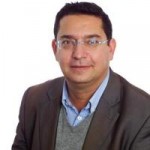 Enseignant-chercheur en épistémologie du numérique et des systèmes complexes
Enseignant-chercheur en épistémologie du numérique et des systèmes complexes
Pierre Saurel est Maître de conférences en épistémologie du numérique et des systèmes complexes à l’Université Paris-Sorbonne. Pierre Saurel est spécialiste en droit des nouvelles technologies, de l’informatique et de la communication. Il intervient auprès de start-up et de sociétés innovantes en conseil et contentieux (droit des sociétés, statuts, pactes, contrats commerciaux, financements, JEI, CIR) et de PME pour leurs projets innovants ou numériques (conseil, contrats, CIR, sécurité des systèmes d’information, cybercriminalité, expertises judiciaires). Pierre Saurel a une double formation d’avocat et d’ingénieur qui lui permet d’aborder en profondeur les dossiers technologiques avec les équipes opérationnelles (DSI, RSSI) lorsque cela est nécessaire.
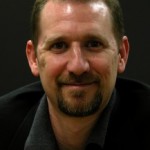 David Williamson Shaffer is a Professor at the University of Wisconsin-Madison in the Department of Educational Psychology and a Game Scientist at the Wisconsin Center for Education Research. Before coming to the University of Wisconsin, Dr. Shaffer taught grades 4-12 in the United States and abroad, including two years working with the Asian Development Bank and US Peace Corps in Nepal. His M.S. and Ph.D. are from the Media Laboratory at the Massachusetts Institute of Technology, and he taught in the Technology and Education Program at the Harvard Graduate School of Education. Dr. Shaffer was a 2008-2009 European Union Marie Curie Fellow. He studies how new technologies change the way people think and learn, and his most recent book is How Computer Games Help Children Learn.
David Williamson Shaffer is a Professor at the University of Wisconsin-Madison in the Department of Educational Psychology and a Game Scientist at the Wisconsin Center for Education Research. Before coming to the University of Wisconsin, Dr. Shaffer taught grades 4-12 in the United States and abroad, including two years working with the Asian Development Bank and US Peace Corps in Nepal. His M.S. and Ph.D. are from the Media Laboratory at the Massachusetts Institute of Technology, and he taught in the Technology and Education Program at the Harvard Graduate School of Education. Dr. Shaffer was a 2008-2009 European Union Marie Curie Fellow. He studies how new technologies change the way people think and learn, and his most recent book is How Computer Games Help Children Learn.
David Williamson Shaffer is an internationally recognized expert on teaching and assessing 21st Century skills through educational games. He is best known for the development of Virtual Internships for students in high school and college and for corporate training and assessment, as well as his work using quantitative ethnography to measure complex thinking. Dr. Shaffer is a highly sought-after speaker, teaching a course at the University of Wisconsin on making effective presentations. He is currently a Professor of Learning Science at the University of Wisconsin-Madison and a Game Scientist at the Wisconsin Center for Education Research. Before coming to the University of Wisconsin, Dr. Shaffer was a teacher, teacher-trainer, curriculum developer, and game designer, including work with the Asian Development Bank and US Peace Corps in Nepal and as a 2008-2009 European Union Marie Curie Fellow. His Ph.D. is from the Media Laboratory at the Massachusetts Institute of Technology. His best known book is How Computer Games Help Children Learn.
 I received my PhD at the University of California at Berkeley in 1967 in the Department of Education and then did two years postdoctoral work, also at Berkeley, in the Psychology Department. From there I taught at Tel Aviv University for 39 years. When at TAU, I was the first incumbent of the Branco Weiss Chair for Research in Child Development and Education. While teaching at TAU, I left academia for three years to be a public servant, working in the Israeli Ministry of Education as its Chief Scientist (no, this is not a title from Orwell’s 1984). Among the innovations I fostered in that capacity, I constructed an index through which $1.5 billion dollars have been distributed annually for teaching hours. It was then that I saw, first-hand, the role of politics (both large and small) in educational policy-making. I am currently teaching at the Center for Academic Studies in Or Yehuda near Tel Aviv. In addition, I was elected as a foreign affiliate of the National Academy of Education (USA) and was a resident scholar at the Rockefeller Foundation’s center in Bellagio.
I received my PhD at the University of California at Berkeley in 1967 in the Department of Education and then did two years postdoctoral work, also at Berkeley, in the Psychology Department. From there I taught at Tel Aviv University for 39 years. When at TAU, I was the first incumbent of the Branco Weiss Chair for Research in Child Development and Education. While teaching at TAU, I left academia for three years to be a public servant, working in the Israeli Ministry of Education as its Chief Scientist (no, this is not a title from Orwell’s 1984). Among the innovations I fostered in that capacity, I constructed an index through which $1.5 billion dollars have been distributed annually for teaching hours. It was then that I saw, first-hand, the role of politics (both large and small) in educational policy-making. I am currently teaching at the Center for Academic Studies in Or Yehuda near Tel Aviv. In addition, I was elected as a foreign affiliate of the National Academy of Education (USA) and was a resident scholar at the Rockefeller Foundation’s center in Bellagio.
My main area of expertise is cognitive development and over the past 13 years, I have been attempting to understand teaching from the perspective of the cognitive sciences and trying to foster a multi-disciplinary cognitive approach to the study of teaching. That idea has carried me to many domains. Among them are anthropology (teaching is universal, i.e., species-typical), cultural evolution (teaching is one form of social learning that allows for cumulative human culture), animal teaching (other animals teach but human teaching is different and species-unique), child development (teaching is developmentally reliable: precursors of teaching appear at age 1, teaching probably begins at age 3 but surely occurs at age 5, and it develops through adulthood).
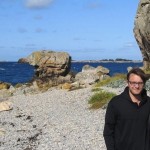 Postdoctoral researcher at the Institut Jean Nicod and Laboratoire de la Psychologie de la Perception. My research asks how core knowledge continues to operate into adulthood in automatic and unconscious ways. I have made a range of recent discoveries showing, in particular, that core knowledge automatically guides adult processes of language, memory, visual attention, and higher level reasoning. I also look at how such structures develop through childhood. « Core knowledge » refers to a set of cognitive systems that appear very early in human development, universally across cultures, and are often preserved to some degree by natural selection (thus appearing in primate species). Some examples are an understanding of basic object mechanics, numbers, other people’s mental states, and even social categories (e.g. « my group » vs. « outsider »).
Postdoctoral researcher at the Institut Jean Nicod and Laboratoire de la Psychologie de la Perception. My research asks how core knowledge continues to operate into adulthood in automatic and unconscious ways. I have made a range of recent discoveries showing, in particular, that core knowledge automatically guides adult processes of language, memory, visual attention, and higher level reasoning. I also look at how such structures develop through childhood. « Core knowledge » refers to a set of cognitive systems that appear very early in human development, universally across cultures, and are often preserved to some degree by natural selection (thus appearing in primate species). Some examples are an understanding of basic object mechanics, numbers, other people’s mental states, and even social categories (e.g. « my group » vs. « outsider »).
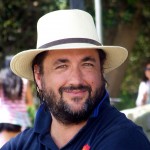 André Tricot is Professor of psychology and head the Work and Cognition Lab. (French national council for research – CNRS). He trains teachers at the School of Education, University of Toulouse, France. André was visiting Professor at the School of Education, University of New South Wales, Sydney in 2011-12. He obtained his PhD in Cognitive Psychology, University of Aix-Marseille, France in 1995. He collaborates with several universities and companies, mainly in the domains of human factors for aeronautics and education. André’s main research topics include learning and information seeking with digital documents, applied ergonomics, education, instructional design, documents use, human computer interaction, applied psychology, human factors and cognitive load theory. More accurately, André’s work is mainly focused on two long-term research questions: (a) the study of human learning in digital environments. Following an ergonomic approach, his work aims to improve digital media to increase learning. This includes analysing the cognitive load involved in learning and the cognitive processing of the material. The fields of application are academic (from school to university) and industrial (e.g. training in the aerospace sector). (b) the study of information retrieval in digital environments. Aim is to understand the cognitive processes involved in this daily activity. Work is focused on the difficulties to seek, find, sort and evaluate information. Applications are academic (identification of new information skills that have to be taught) and industrial (design of information systems best suited to airplane pilots and technicians). Recently, André’s work is oriented towards learning disorders, always with the same perspective: improving digital media to enhance learning.
André Tricot is Professor of psychology and head the Work and Cognition Lab. (French national council for research – CNRS). He trains teachers at the School of Education, University of Toulouse, France. André was visiting Professor at the School of Education, University of New South Wales, Sydney in 2011-12. He obtained his PhD in Cognitive Psychology, University of Aix-Marseille, France in 1995. He collaborates with several universities and companies, mainly in the domains of human factors for aeronautics and education. André’s main research topics include learning and information seeking with digital documents, applied ergonomics, education, instructional design, documents use, human computer interaction, applied psychology, human factors and cognitive load theory. More accurately, André’s work is mainly focused on two long-term research questions: (a) the study of human learning in digital environments. Following an ergonomic approach, his work aims to improve digital media to increase learning. This includes analysing the cognitive load involved in learning and the cognitive processing of the material. The fields of application are academic (from school to university) and industrial (e.g. training in the aerospace sector). (b) the study of information retrieval in digital environments. Aim is to understand the cognitive processes involved in this daily activity. Work is focused on the difficulties to seek, find, sort and evaluate information. Applications are academic (identification of new information skills that have to be taught) and industrial (design of information systems best suited to airplane pilots and technicians). Recently, André’s work is oriented towards learning disorders, always with the same perspective: improving digital media to enhance learning.
 Dan Wagner is the UNESCO Chair in Learning and Literacy, and Professor of Education at the University ofwww.literacy.org), and Director of Penn’s International Educational Development Program (IEDP; http://www.gse.upenn.edu/iedp) in graduate study. After an undergraduate degree in Engineering at Cornell University, and voluntary service in the Peace Corps (Morocco), he received his Ph.D. in Psychology at the University of Michigan, was a two-year postdoctoral fellow at Harvard University, a Visiting Fellow (twice) at the International Institute of Education Planning in Paris, a Visiting Professor at the University of Geneva (Switzerland), and a Fulbright Scholar at the University of Paris. Dr. Wagner has extensive experience in national and international educational issues, and has served as an advisor to UNESCO, UNICEF, World Bank, USAID, DFID, and others on international development issues. He is a fellow of the American Psychological Association, the American Anthropological Association, and the American Educational Research Association. His most recent multi-year projects have been in India, South Africa, and Morocco. He recently served as Chair of the Brookings Global Research Task Force on Learning. Dr. Wagner was the recipient of the 2014 UNESCO Confucius International Literacy Prize. In addition to over 160 professional publications, Dr. Wagner has written/edited 23 books, including: Literacy: Developing the future (in 5 languages); Literacy: An international handbook; Learning to bridge the digital divide; New technologies for literacy and adult education: A global review; Monitoring and evaluation of ICT for education in developing countries; Smaller, quicker, cheaper: Improving learning assessments for developing countries; Learning and education in developing countries: Research and policy for the UN post-2015 development goals.
Dan Wagner is the UNESCO Chair in Learning and Literacy, and Professor of Education at the University ofwww.literacy.org), and Director of Penn’s International Educational Development Program (IEDP; http://www.gse.upenn.edu/iedp) in graduate study. After an undergraduate degree in Engineering at Cornell University, and voluntary service in the Peace Corps (Morocco), he received his Ph.D. in Psychology at the University of Michigan, was a two-year postdoctoral fellow at Harvard University, a Visiting Fellow (twice) at the International Institute of Education Planning in Paris, a Visiting Professor at the University of Geneva (Switzerland), and a Fulbright Scholar at the University of Paris. Dr. Wagner has extensive experience in national and international educational issues, and has served as an advisor to UNESCO, UNICEF, World Bank, USAID, DFID, and others on international development issues. He is a fellow of the American Psychological Association, the American Anthropological Association, and the American Educational Research Association. His most recent multi-year projects have been in India, South Africa, and Morocco. He recently served as Chair of the Brookings Global Research Task Force on Learning. Dr. Wagner was the recipient of the 2014 UNESCO Confucius International Literacy Prize. In addition to over 160 professional publications, Dr. Wagner has written/edited 23 books, including: Literacy: Developing the future (in 5 languages); Literacy: An international handbook; Learning to bridge the digital divide; New technologies for literacy and adult education: A global review; Monitoring and evaluation of ICT for education in developing countries; Smaller, quicker, cheaper: Improving learning assessments for developing countries; Learning and education in developing countries: Research and policy for the UN post-2015 development goals.
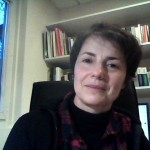 Tiziana Zalla is a CNRS researcher working in cognitive science and psychopathology at Institut Jean Nicod, affiliated with the Department of Cognitive Studies (DEC) at Ecole Normale Supérieure. She studied cognitive psychology and philosophy of Mind at the University “La Sapienza” in Rome. She was trained in neuropsychology at the Salpêtrière Hospital in Paris (1992-1996) and got a PhD in cognitive sciences at CREA-Ecole Polytechnique (1996).
Tiziana Zalla is a CNRS researcher working in cognitive science and psychopathology at Institut Jean Nicod, affiliated with the Department of Cognitive Studies (DEC) at Ecole Normale Supérieure. She studied cognitive psychology and philosophy of Mind at the University “La Sapienza” in Rome. She was trained in neuropsychology at the Salpêtrière Hospital in Paris (1992-1996) and got a PhD in cognitive sciences at CREA-Ecole Polytechnique (1996).
She worked at the Cognitive Neurosciences Section, National Institutes of Health, in Bethesda (1997-1999) and at the Institute of Cognitive Sciences in Lyon (1999-2003).
She currently carries out researches in psychopathology of Asperger Syndrome at the Chenevier-Mondor Psychiatric Hospital in Creteil in collaboration with Marion Leboyer (INSERM U 841). Her main investigations and conceptual works are focused on impairments in social cognition and in particular on moral reasoning and mindreading in autism.
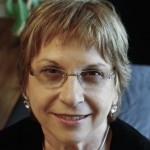 I received my Ph.D. in Mathematics Education from the Technion, Haifa (Israel Institute of Technology) in 1987. Following a two-year post doctorate fellowship at LRDC, the University of Pittsburgh, I returned as a full time faculty member to the Technion, from where I retired after 22 years. Since 2009 I hold a faculty position at NYU and serve as the director of NYU’s Mathematics Education Program.
I received my Ph.D. in Mathematics Education from the Technion, Haifa (Israel Institute of Technology) in 1987. Following a two-year post doctorate fellowship at LRDC, the University of Pittsburgh, I returned as a full time faculty member to the Technion, from where I retired after 22 years. Since 2009 I hold a faculty position at NYU and serve as the director of NYU’s Mathematics Education Program.
My recent work stems from the assumption that examples play a significant role in learning (of mathematics). In this context, I study the interplay between mathematical examples, definitions, and proof. I am interested in how students think with and through examples when they are engaged in mathematical activities (e.g., proving) and how mathematics teachers use and think about examples when they plan their teaching and when they actually teach. My earlier work focused on mathematics teacher-education.
Compas’ advisors within the Department of cognitive studies, Ens
 I was trained in Psychology at Univ Lyon II. I then obtained a Master degree in Cognitive Sciences and a Ph.D. in Experimental Psychology in the same university. I have worked at the Applied Psychology Unit of the Medical Research Council (MRC, Cambridge, UK) as a post-doctoral scientist, and at the Institute of Hearing Research of the MRC (Glasgow, UK) as a junior scientist. I was recruited at the Univ Paris Descartes as lecturer (1997) and then full professor (2001), before taking a position of full professor in Experimental Psychology at the Ecole normale superieure (Paris) in 2011. I am a fellow of the Acoustical Society of America and a former (junior) member of IUF (2001). My research program focuses on temporal processing by the normal and impaired auditory system in humans.
I was trained in Psychology at Univ Lyon II. I then obtained a Master degree in Cognitive Sciences and a Ph.D. in Experimental Psychology in the same university. I have worked at the Applied Psychology Unit of the Medical Research Council (MRC, Cambridge, UK) as a post-doctoral scientist, and at the Institute of Hearing Research of the MRC (Glasgow, UK) as a junior scientist. I was recruited at the Univ Paris Descartes as lecturer (1997) and then full professor (2001), before taking a position of full professor in Experimental Psychology at the Ecole normale superieure (Paris) in 2011. I am a fellow of the Acoustical Society of America and a former (junior) member of IUF (2001). My research program focuses on temporal processing by the normal and impaired auditory system in humans.
My research program focuses on the processing of the temporal structure of sounds by the normal and impaired auditory system in humans. I study the auditory perception of two types of temporal modulations of the acoustic signal, the temporal envelope and temporal fine structure, using various approaches (psychophysics, clinical audiology, computer modeling, developmental psychology, neuropsychology, brain imaging, electrophysiology).
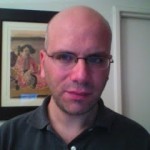 Researcher at Institut Jean Nicod (CNRS – ENS – EHESS), Département d’études cognitives
Researcher at Institut Jean Nicod (CNRS – ENS – EHESS), Département d’études cognitives
École Normale Supérieure, Paris.
In the Circle
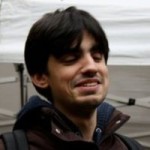 I’m a PhD Student working at the CNAM Paris about serious games design methodology on learning and reflective decision-making. I also worked as a serious game designer and as a consultant for the Canope/CNDP Network (french national resources network for teachers) on games and learning issues.
I’m a PhD Student working at the CNAM Paris about serious games design methodology on learning and reflective decision-making. I also worked as a serious game designer and as a consultant for the Canope/CNDP Network (french national resources network for teachers) on games and learning issues.
 Thierry de Vulpillières est Directeur des partenariats éducation. Il a en charge le développement des partenariats avec l’ensemble des acteurs du monde de l’éducation (enseignants, établissements scolaires, associations, syndicats, encadrements, éditeurs…) afin de faciliter le développement des usages des Technologies de l’Information et de la Communication dans l’Education.
Thierry de Vulpillières est Directeur des partenariats éducation. Il a en charge le développement des partenariats avec l’ensemble des acteurs du monde de l’éducation (enseignants, établissements scolaires, associations, syndicats, encadrements, éditeurs…) afin de faciliter le développement des usages des Technologies de l’Information et de la Communication dans l’Education.
Formatrice académique REP+ » (Académie de Versailles, département des Hauts-de-Seine)
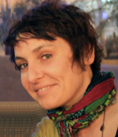 Antonine Goumi is lecturer (MCU) in cognitive psychology at Paris-Ouest University and member of the CHArt UPO laboratory (Cognitions Humaine et Artificielle – EA 4004). She works on the use of text-messages by adolescents, and in particular on the relationship between text-messages writing and literacy skills and on the creativity involved in textisms. She received her PhD from the University of Poitiers (France) where she began her work at the Cognition and Learning Research Center (CeRCA – UMR CNRS 7295) with Josie Bernicot and Jean-François Rouet. Her research interests are related to technologies and education.
Antonine Goumi is lecturer (MCU) in cognitive psychology at Paris-Ouest University and member of the CHArt UPO laboratory (Cognitions Humaine et Artificielle – EA 4004). She works on the use of text-messages by adolescents, and in particular on the relationship between text-messages writing and literacy skills and on the creativity involved in textisms. She received her PhD from the University of Poitiers (France) where she began her work at the Cognition and Learning Research Center (CeRCA – UMR CNRS 7295) with Josie Bernicot and Jean-François Rouet. Her research interests are related to technologies and education.
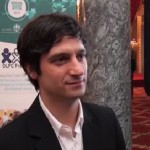 Bastien Guerry studied philosophy and cognitive sciences and he is now a freelance developer and consultant, passionate about sharing his experience as a free software contributor. He participated to the « One Laptop Per Child » project, co-founded the french chapter « OLPC France » and worked as the first employee of Wikimedia France. He co-edited « Apprendre demain: éducation et sciences cognitives à l’ère du numérique » in 2008 and contributed to « Open Models: les business models de l’économie ouverte » in 2014.
Bastien Guerry studied philosophy and cognitive sciences and he is now a freelance developer and consultant, passionate about sharing his experience as a free software contributor. He participated to the « One Laptop Per Child » project, co-founded the french chapter « OLPC France » and worked as the first employee of Wikimedia France. He co-edited « Apprendre demain: éducation et sciences cognitives à l’ère du numérique » in 2008 and contributed to « Open Models: les business models de l’économie ouverte » in 2014.
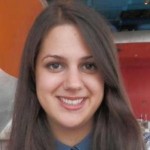 I did my undergrad degree in psychology and masters in cognitive science. Compas group members have helped me define my research topic and enouraged my wish to work on applying cognitive science to eduation. I am now a PhD candidate at Paris 8 University investigating teachers’ conceptions of student’s learning, in the field of mathematics. I also work on a projet called ACE-ArithmEcole in the arithemetic word probleme group. Together with the other research groups we have developped a complet math program for 1st and 2nd grade math which is now being implemented in the Paris, Lille, Rennes and Marseille area.
I did my undergrad degree in psychology and masters in cognitive science. Compas group members have helped me define my research topic and enouraged my wish to work on applying cognitive science to eduation. I am now a PhD candidate at Paris 8 University investigating teachers’ conceptions of student’s learning, in the field of mathematics. I also work on a projet called ACE-ArithmEcole in the arithemetic word probleme group. Together with the other research groups we have developped a complet math program for 1st and 2nd grade math which is now being implemented in the Paris, Lille, Rennes and Marseille area.
 I am a post-doctoral researcher at Rationalités Contemporaines center (Paris-Sorbonne). I did my dissertation under the supervision of Daniel Andler and in collaboration with Walter Mischel. I am interested in the psychology of human excellence of character. In a strong interdisciplinary spirit, I draw from models in contemporary empirical psychology to better understand the high level of courage, empathy and wisdom that ancient philosophy called Virtue. I am currently in charge of an interdisciplinary project at the pedagogical center Compas, aiming at developing software applications to train wise judgment
I am a post-doctoral researcher at Rationalités Contemporaines center (Paris-Sorbonne). I did my dissertation under the supervision of Daniel Andler and in collaboration with Walter Mischel. I am interested in the psychology of human excellence of character. In a strong interdisciplinary spirit, I draw from models in contemporary empirical psychology to better understand the high level of courage, empathy and wisdom that ancient philosophy called Virtue. I am currently in charge of an interdisciplinary project at the pedagogical center Compas, aiming at developing software applications to train wise judgment  Experiment Design Engineer – INSERM – Neuroimagerie Cognitive Unit, headed by Stanislas Dehaene. I am currently working between the lab and serious-games industry to design a research based reading method for children. Applying scientific methodology
Experiment Design Engineer – INSERM – Neuroimagerie Cognitive Unit, headed by Stanislas Dehaene. I am currently working between the lab and serious-games industry to design a research based reading method for children. Applying scientific methodology
